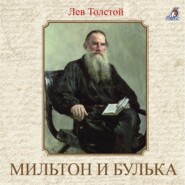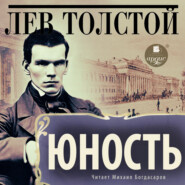По всем вопросам обращайтесь на: info@litportal.ru
(©) 2003-2025.
✖
What Shall We Do?
Настройки чтения
Размер шрифта
Высота строк
Поля
It was no longer possible to assert that men are born of different kind and quality and have a different destiny; and the old justification, though still held by some, has been little by little destroyed and has now almost entirely disappeared.
But though the justification disappeared, the fact itself, – of the freeing of some men from labour, and the appropriation by them of other men's labour, remained the same for those who had the power to enforce it. For this existing fact new excuses have constantly been invented, in order that without asserting the difference of human beings, men might be able with apparent justice to free themselves from personal labour.
A great many justifications have been invented. However strange it may seem, the main object of all that has been called science, and the ruling tendency of science, has been to seek out such excuses.
This has been the object of the theological sciences and of the science of law: this was the object of so-called philosophy, and this became lately the object of modern rationalistic science, however strange it appears to us, the contemporaries, who use this justification.
All the theological subtleties which aimed at proving that a certain church is the only true successor of Christ, and that, therefore, she alone has full and uncontrolled power over the souls and bodies of men, had in view this very object.
All the legal sciences, – those of state law, penal law, civil law, and international law, – have this sole aim.
The majority of philosophical theories, especially that of Hegel, which reigned over the minds of men for such a long time, and maintained the assertion that everything which exists is reasonable, and that the state is a necessary form of the development of human personality, had only this one object in view.
Comte's positive philosophy and its outcome, the doctrine that mankind is an organism; Darwin's doctrine of the struggle for existence, directing life and its conclusion, the theory of the diversity of human races, the anthropology now so popular, biology, and sociology, – all have the same aim. These sciences have become favourites, because they all serve for the justification of the existing fact of some men being able to free themselves from the human duty of labour, and to consume other men's labour.
All these theories, as is always the case, are worked out in the mysterious sanctums of augurs, and in vague, unintelligible expressions are spread abroad among the masses and adopted by them.
As in olden times the subtleties of theology, which justified violence in church and state, were the special property of priests; and among the masses of the people, the conclusions, taken by faith, and ready made for them, were circulated, that the power of kings, clergy and nobility was sacred: so afterwards, the philosophical and legal subtleties of so-called science became the property of the priests of science; and through the masses only the ready-made conclusion, accepted by faith, – that social order (the organization of society) must be such as it is, and cannot be otherwise, – was diffused.
So it is now. It is only in the sanctuaries of the modern sages that the laws of life and the development of organisms are analyzed. Whereas in the crowd, the ready-made conclusion, accepted on trust, – that division of labour is a law confirmed by science, and therefore it must be that some starve and toil and others eternally feast, and that this very ruin of some and feasting of others is the undoubted law of man's life, to which we must submit, – is circulated.
The current justification of their idleness by all so-called educated people, with their various activities, from the railway proprietor down to the author or artist, is this: We men who have freed ourselves from the common human duty of taking part in the struggle for existence, are furthering progress, and so we are of great use to all human society, of such use that we counterbalance all the harm we do the people by consuming their labour.
This reasoning seems to the men of our day to be not at all like the reasoning by which the former non-workers justified themselves; just as the reasoning of the Roman emperors and citizens, that but for them the civilized world would go to ruin, seemed to them to be of quite another order from that of the Egyptians and Persians; and so also an exactly similar kind of reasoning seemed in turn to the knights and clergy of the Middle Ages totally different from that of the Romans.
But it only seems. One need only reflect on the justification of our time in order to ascertain that there is nothing new in it. It is only a little differently dressed up, but it is the same because it is based on the same principle. Every justification of one man's consumption of the labour of others, while producing none himself, as with Pharaoh and his soothsayers, the emperors of Rome and those of the Middle Ages and their citizens, knights, priests, and clergy, always consists in these two assertions: First, we take the labour of the masses because we are different from others, people called by God to govern them and to teach them divine truths: Secondly, those who compose the masses cannot be judges of the measure of labour which we take from them for the good we do for them, because, as it has been said by the Pharisees, “This multitude which knoweth not the law are accursed” (John vii. 49).
The people do not understand what is for their good, and therefore they cannot be judges of the benefits done to them. The justification of our time, notwithstanding all apparent originality, consists in facts of the same fundamental assertions: First, we are a different people, – we are an educated people, – we further progress and civilization, and by this fact we procure for the masses a great advantage. Secondly, the uneducated crowd does not understand the advantages we procure for them, and therefore cannot be judges of them.
The fundamental assertions are the same. We free ourselves from labour, appropriate the labour of others, and by this increase the burden of our fellows; and then assert that in compensation for this we bring them a great advantage, of which they, owing to ignorance, cannot be judges.
Is it not, then, the same thing? The only difference lies in this: that formerly the claims on other men's labour were made by citizens, Roman priests, knights, and nobility, and now these claims are put forward by a caste who term themselves educated.
The lie is the same, because the men who justify themselves are in the same false position. The lie consists in the fact, that, before beginning to reason about the advantages conferred on the workers by people who have freed themselves from labour, – certain men, Pharaohs, priests, or we ourselves, educated people, assume this position first, and only afterwards manufacture a justification for it.
The very position universally serves as a basis for the justification. The difference of our justification from the ancient ones consists merely in the fact that it is more false and less well grounded. The old emperors and popes, if they themselves, and the people, believed in their divine calling, could easily explain why they were to control the labour of others: they asserted that they were appointed by God himself for this very thing, and from God they had a commandment to teach the people divine truths revealed to them, and to govern them.
But modern, educated men, who do not labour with their hands, and who acknowledge the equality of all men, cannot explain why they and their children (for education is only by money; that is, by power) should be those lucky persons called to an easy, idle life, out of those millions who by hundreds and thousands are perishing to make it possible for them to be educated. Their only justification consists in this, that, just as they are, instead of doing harm to the workers by freeing themselves from labour, and by swallowing up labour, they bring to the people some advantages, unintelligible to them, which compensate for all the evil they perpetrate.
CHAPTER XXVII
The theory by which men who have freed themselves from personal labour justify themselves, is, in its simplest and most exact form, this: “We men, having freed ourselves from work, and having by violence appropriated the labour of others, we find ourselves better able to benefit them.” In other words, certain men, for doing the people a palpable and comprehensible harm, – utilizing their labour by violence, and thereby increasing the difficulty of their struggles with nature, – do to them an impalpable and incomprehensible good. This is a very strange proposition; but the men, both of former as well of modern times, who have lived on the labour of workmen, believe it, and calm their conscience by it.
Let us see in what way it is justified, in different classes of men who have freed themselves from labour in our own days.
“I serve men by my activity in church or state, – as king, minister, archbishop; I serve men by my trading or by industry; I serve men by my activity in the departments of science or art. By our activities we are all as necessary to the people as they are to us.”
So say various men of to-day who have freed themselves from labour.
Let us consider seriatim the principles upon which they base the usefulness of their activity.
There are only two indications of the usefulness of any activity of one man for another: (1) an exterior indication, – the acknowledgement of the utility of the activity by those to whom it is applied; and (2) an interior indication, – the desire to be of use to others lying at the root of the activity of the one who is trying to be of use.
Statesmen (I include the Church dignitaries appointed by the government in the category of statesmen) are, it is said, of use to those whom they govern. The emperor, the king, the president of a republic, the prime minister, the minister of justice, the minister of war, the minister of public instruction, the bishop, and all under them who serve the state, all live free from the struggle of mankind for existence, having laid all the burden of this struggle on someone else, on the ground that their non-activity compensates for this.
Let us apply the first indication to those for whose welfare the activity of statesmen is bestowed. Do they, I ask, recognize the usefulness of this activity?
Yes, it is recognized. Most men consider statesmanship necessary to them. The majority recognize the usefulness of this activity in principle; but in all its manifestations known to us, in all particular cases known to us, the usefulness of each of the institutions and of each of the manifestations of this activity is not only denied by those for whose advantage it is performed, but they assert that it is even pernicious and hurtful. There is no state function or social activity which is not considered by many men to be hurtful: there is no institution which is not considered pernicious, – courts of justice, banks, local self-government, police, clergy. Every state activity, from the minister down to the policeman, from the bishop to the sexton, is considered by some men to be useful and by others to be pernicious. And this is the case not only in Russia but throughout the world; in France as well as in America.
The activity of the republican party is considered pernicious by the radical party, and vice versa: the activity of the radical party, if the power is in their hands, is considered bad by the republican and other parties. But not only is it a fact that the activity of statesmen is never considered by all men to be useful, this activity has, besides, this peculiarity, that it must always be carried out by violence, and that, to attain its end, murders, executions, prisons, taxes raised by force, and so on, became necessary.
It appears therefore that besides the fact that the usefulness of state activity is not recognized by all men, and is always denied by one portion of men, this usefulness has the peculiarity of vindicating itself always by violence.
Therefore the usefulness of state activity cannot be confirmed by the first indication, – i.e., the fact that it is recognized by those men for whom it is said to be performed.
Let us apply the second test. Let us ask statesmen themselves, from the Tsar down to the policeman, from the president to the secretary, from the patriarch to the sexton, begging for a sincere answer, whether, in occupying their respective positions they have in view the good which they wish to do for men or something else. In their desire to fill the situation of a Tsar, a president, a minister, a police-sergeant, a sexton, a teacher, are they moved by the desire of being useful to men or for their own personal advantage? And the answer of sincere men would be that their chief motive is their own personal advantage.
So it appears that one class of men, who live by the labour of some others who are perishing by these labours, compensate for this indubitable evil by an activity which is always considered by a great many men to be not only useless, but pernicious; which cannot be accepted voluntarily, but to which men must always be compelled, and the aim of which is not the benefit of others but the personal advantage of the men who perform it.
What is it, then, that confirms the theory that state activity is useful for humanity? Only the fact that the men who perform it firmly profess to believe it to be useful, and that it has been always in existence. But so some not only useless, but very pernicious institutions, like slavery, prostitution, and wars, have always been in existence.
Business people (merchants, manufacturers, railway proprietors, bankers, land-owners) believe that they do a good which compensates for the harm undoubtedly done by them. On what grounds do they believe this? To the question, By whom is the usefulness of their activity recognized? men in church and in state are able to point to the thousands and millions of working-people who in principle recognize the usefulness of state and church activity. But to whom will bankers, distillers, manufacturers of velvet, of bronzes, of looking-glasses, to say nothing of guns, – to whom will they point when we ask them, Is their usefulness recognized by public opinion?
If men can be found who recognize the usefulness of manufacturing chintzes, rails, beer, and such like things, there will be found also a still greater number of men who consider the manufacture of these articles pernicious.
As for the merchants whose activity is confined to prices, and land-owners, nobody would even attempt to justify them.
Besides, this activity is always associated with harm to working-people, and with violence, which, if less direct than that of the state, is yet just as cruel in its consequences. For the activities displayed in industry and in trade are entirely based on taking advantage of the wants of working-people in every form in order to compel them to hard and hated labour; to buying cheap, and to selling necessaries at the highest possible price and to raising the interest on money. From whatever point we consider this activity we can see that the usefulness of business-men is not recognised by those for whom it is expended, neither generally nor in particular cases; and by the majority their activity is considered to be directly pernicious.
If we were to apply the second test and to ask, What is the chief motive of the activity of business-men? we should receive a still more determinate answer than that on the activity of statesmen. If a statesman says that besides a personal advantage he has in view the common benefit, we cannot help believing him, and each of us knows such men. But a business-man, from the very nature of his occupations cannot have in view a common advantage, and would be ridiculous in the sight of his fellows if he were in his business aiming at something besides increasing his wealth and keeping it.
And, therefore, working-people do not consider the activity of business-men of any advantage to them. Their activity is associated with violence; and its object is not their good but always and only personal advantage; and yet, strange to say, these business-men are so assured of their own usefulness that they boldly, for the sake of their imaginary good, do an undoubted, obvious harm to workmen by extricating themselves from labour, and consuming the produce of the working-classes.
Scientists and artists have also freed themselves from labour by putting it on others, and live with a quiet conscience believing that they bring sufficient advantages to other men to compensate for it. On what is this assurance based? Let us ask them as we have done statesmen and business-men. Is the utility of the arts and sciences recognized by all, or even by the majority, of working-people?
We shall receive a very sad answer. The activity of men in the State Church and government offices is recognized to be useful in theory by almost all, and in application by the majority of those for whom it is performed. The activity of business-men is recognized only by those who are engaged in it or who desire to practise it. Those who bear on their shoulders all the labour of life and who feed and clothe the scientists and artists cannot recognize the usefulness of the activity of these men because they cannot even form an idea about an activity which always appears to workmen useless and even depraving.
Thus, without any exception, working-people think the same about universities, libraries, conservatories, picture and statue galleries, and theatres, which are built at their expense.
A workman considers this activity so decidedly pernicious that he does not send his children to be taught; and in order to compel people to accept this activity it has everywhere been found necessary to introduce a law compelling parents to send the children to school.
A workman always looks at this activity with ill-will, and only ceases to look at it so when he ceases to be a workman, and through gain and so-called education passes out of the class of working-people into the class of men who live on the neck of others.
Notwithstanding the fact that the usefulness of the activity of scientists and artists is not recognized and even cannot be recognized by any workman, these men are, all the same, compelled to make sacrifices for such an activity.
A statesman simply sends another to the guillotine or to prison; a business-man, utilizing the labour of someone else, takes from him his last resource, leaving him the alternative of starvation or labour destructive to his health and life: but a man of science or of art seemingly compels nobody to do anything; he merely offers the good he has done to those who are willing to take it; but, to be able to make his productions undesirable to the working-people, he takes away from them by violence, through the statesmen, a great part of their labour for the building and keeping open of academies, universities, colleges, schools, museums, libraries, conservatories, and for the wages for himself and his fellows.
But if we were to ask the scientists and artists the object which they are pursuing in their activity, we should receive the most astonishing replies.

















